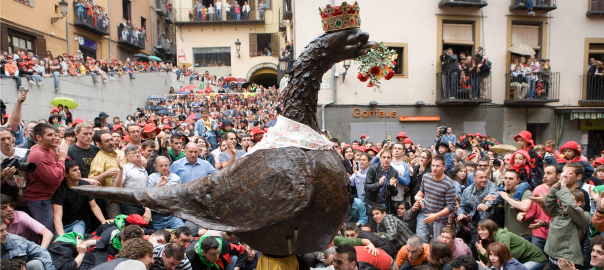20.06.2019 - 13:37
|
Actualització: 20.06.2019 - 15:37
One of Catalonia’s most popular and well-known local summer festivals is La Patum, which takes place every June in Berga, the capital of Berguedà county, in central Catalonia. Considered a Traditional Festival of National Interest, the Patum was declared a Masterpiece of the Oral and Intangible Heritage of Humanity by UNESCO in 2005.
Although it coincides with Corpus Christi, La Patum features traditional dances, drumming, groups parading in fancy dress, and fireworks, and little to do with religious ceremony. In fact, La Patum‘s origins go back to pre-Christian summer solstice celebrations, with some of its more bizarre elements added during the later Middle Ages. An example is the festival’s climax, the ‘Plens’, which sees firework-wielding ‘devils’ dancing to the rhythm of drums and turning Berga’s cramped main square into a vision of hell.
The festival features a number of mythical characters performing in public, including the Turcs i Cavallets (Turks and Little Knights) and the Nans Vells (The Old Dwarfs). Many of these mythical figures in the festival were first documented as far back as the early 17th-century, and also include Les Guites (folkloric “mules”) and Els Gegants (The Giants). The one element that is present at all the activities in the festival is the Tabal, a huge drum first mentioned in 1621 that marks out the rhythm for the event’s public dances.
Three years ago, one of the traditional dances was performed to the rhytm of a song by Bruce Springsteen:
Given its popularity, La Patum attracts thousands of visitors, with hotels rooms selling out and as many as 6,000 people crowding into its small main square for the ‘Plens.’ With so many people in one place all determined to enjoy themselves, La Patum has also become associated with raucous revelry and the overconsumption of alcohol. The organizers have made efforts to curb this side of the festivities in recent years, with measures such as subsidizing non-alcoholic drinks and offering free bottles of water.


